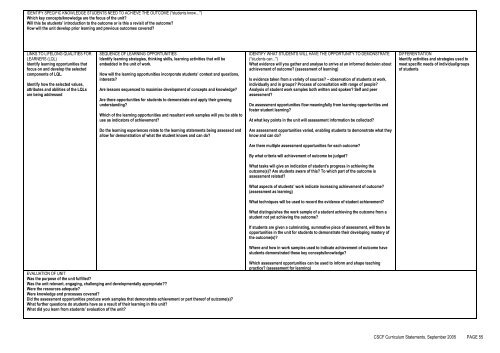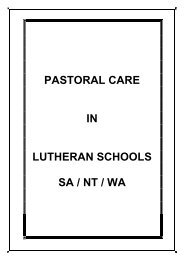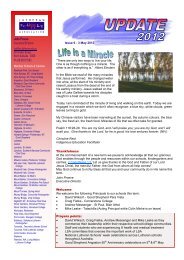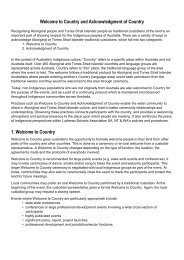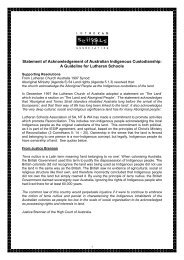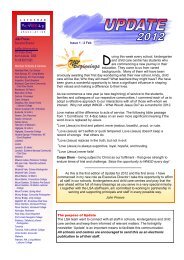2012 CSCF Curriculum Statements.pdf - Lutheran Schools ...
2012 CSCF Curriculum Statements.pdf - Lutheran Schools ...
2012 CSCF Curriculum Statements.pdf - Lutheran Schools ...
You also want an ePaper? Increase the reach of your titles
YUMPU automatically turns print PDFs into web optimized ePapers that Google loves.
IDENTIFY SPECIFIC KNOWLEDGE STUDENTS NEED TO ACHIEVE THE OUTCOME ("students know…")Which key concepts/knowledge are the focus of the unit?Will this be students’ introduction to the outcome or is this a revisit of the outcome?How will the unit develop prior learning and previous outcomes covered?LINKS TO LIFELONG QUALITIES FORLEARNERS (LQL)Identify learning opportunities thatfocus on and develop the selectedcomponents of LQL.Identify how the selected values,attributes and abilities of the LQLsare being addressedSEQUENCE OF LEARNING OPPORTUNITIESIdentify learning strategies, thinking skills, learning activities that will beembedded in the unit of work.How will the learning opportunities incorporate students’ context and questions,interests?Are lessons sequenced to maximise development of concepts and knowledge?Are there opportunities for students to demonstrate and apply their growingunderstanding?Which of the learning opportunities and resultant work samples will you be able touse as indicators of achievement?IDENTIFY WHAT STUDENTS WILL HAVE THE OPPORTUNITY TO DEMONSTRATE("students can...")What evidence will you gather and analyse to arrive at an informed decision aboutachievement of outcome? (assessment of learning)Is evidence taken from a variety of sources? – observation of students at work,individually and in groups? Process of consultation with range of people?Analysis of student work samples both written and spoken? Self and peerassessment?Do assessment opportunities flow meaningfully from learning opportunities andfoster student learning?At what key points in the unit will assessment information be collected?DIFFERENTIATIONIdentify activities and strategies used tomeet specific needs of individual/groupsof studentsDo the learning experiences relate to the learning statements being assessed andallow for demonstration of what the student knows and can do?Are assessment opportunities varied, enabling students to demonstrate what theyknow and can do?Are there multiple assessment opportunities for each outcome?By what criteria will achievement of outcome be judged?What tasks will give an indication of student’s progress in achieving theoutcome(s)? Are students aware of this? To which part of the outcome isassessment related?What aspects of students’ work indicate increasing achievement of outcome?(assessment as learning)What techniques will be used to record the evidence of student achievement?What distinguishes the work sample of a student achieving the outcome from astudent not yet achieving the outcome?If students are given a culminating, summative piece of assessment, will there beopportunities in the unit for students to demonstrate their developing mastery ofthe outcome(s)?Where and how in work samples used to indicate achievement of outcome havestudents demonstrated these key concepts/knowledge?EVALUATION OF UNITWas the purpose of the unit fulfilled?Was the unit relevant, engaging, challenging and developmentally appropriate??Were the resources adequate?Were knowledge and processes covered?Did the assessment opportunities produce work samples that demonstrate achievement or part thereof of outcome(s)?What further questions do students have as a result of their learning in this unit?What did you learn from students’ evaluation of the unit?Which assessment opportunities can be used to inform and shape teachingpractice? (assessment for learning)<strong>CSCF</strong> <strong>Curriculum</strong> <strong>Statements</strong>, September 2005 PAGE 55


